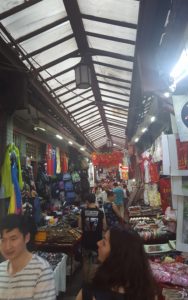The Chinese language is steeped in thousands of years of history, and over time popular phrases have developed and appeared in everyday life. An interesting characteristic of the language is their tendency for simplification. While this is not specifically slang, this characteristic makes studying abroad in China easier for students who are still learning the language. Many of the streets are lined with shops that have names describing what type of products the store sells. In this way, even students with a basic knowledge of the language are able to find the stores they need.

During my time studying the Chinese language, I have learned a number of slang terms. Curious to what some general Chinese citizens had to say about different slang terms, I interviewed a few. The first slang term was 也是醉了 (yeshi zuile), the literal translation of the term is ‘also drunk’ but in colloquial use the terms is used to express an individual’s frustration with something unreasonable. The older woman I discussed this with seemed rather unfamiliar with the term, the reason for which became clear after talking with a younger woman. She explained that the saying was most commonly used on online forums rather than in face to face conversations. Much like lol or omg in the English language, this saying helps people easily communicate their feelings over the internet. This more modern saying hasn’t yet had the chance to spread through all the generations. Only time will tell if the saying lasts or if it is merely a fad.
Another saying that my Chinese teacher in high school taught me was 二百五 (er bai wu), the literal meaning of this slang is just 250 but the colloquial use is to call a person very stupid. Both of the women that I talked to disliked the term and said it was not used in polite conversation. Such a negative connotation surrounds the phrase that many times shopkeepers won’t sell an item for that exact amount, choosing instead to add or subtract one yuan. It seems strange that slang can be as simple as a number, and yet still have such a negative meaning. Even with negative sayings and words, the Chinese language is beautiful and diverse. Through my increasing fluency, each day I learn more and more about the country and culture that I have come to love.
